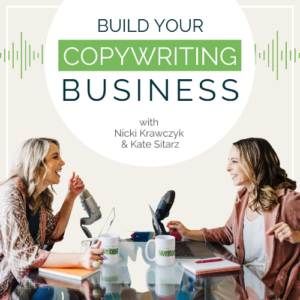Copywriting is marketing or advertising writing that is designed to sell or to persuade. “Copy” is the words that make up that writing, and copywriters are the ones who write that copy.
And make no mistake: It is not about being tricky, pushy, or underhanded. Fundamentally, copywriting is about connecting people who have a need with the best solution to that need and doing it by writing in a way that connects with that audience.
Sometimes the “need” will be a big, important one. For example, parents with a diabetic child may need to find a specialty hospital for that child. The copy on a hospital’s diabetes center webpage helps that family understand that it’s the exact right hospital for them.
And, of course, sometimes it’s a lot less “significant” but still important to the person with the need. A person who needs a quick, healthy snack in the middle of the day but is allergic to nuts finds the answer to her needs when she sees an ad for a low-sugar, no-nut energy bar. She was connected to the answer to her problems via good copywriting.
Copywriting is not just writing headlines or a tag lines. It is about connecting people with the solutions for their needs and their wants by effectively conveying exactly why they are the solutions. It’s a fun challenge—that’s one of the reasons we’re paid well to do it.
Intrigued? Sign up for the free video training to learn more.
Is Copywriting Different Than Content Writing or Blogging?
Yes, copywriting and content writing have different purposes. While copywriting is designed to get someone to take action or perhaps to change someone’s mind, content writing is designed to inspire, engage, or entertain.
Copywriters often write content for their clients, but at their copywriting rates. That’s because copywriters are skilled at being succinct and telling a compelling story. They can apply those skills to create more valuable content for their clients.
Because it doesn’t take as much skill as copywriting, content writing has a lower barrier to entry (if you’re a content writer, you’ve likely seen others competing to write 500-word articles for pennies on the word). That doesn’t mean you can’t or shouldn’t write content! It simply means that having training as a copywriter can make you a more in-demand content writer who can command higher rates for pieces like blog posts, ebooks, and more.
What Do Copywriters Do?
Copywriters work with clients or bosses or project managers to identify the purpose of the project. We learn what we’re trying to convey, how we’re trying to convey it and to whom, and then we craft copy to try to meet that objective. Usually, we also work with a designer to match our words up with their images. We get some feedback, we make some changes as needed, and we deliver fantastic work that has an impact.
You’ll notice I said clients or bosses or project managers — that’s because there are a couple of different ways you can actually be a copywriter.
Read more about what copywriters do >>
How Do Copywriters Work?
First, of course, you can be an on-staff copywriter. In this scenario, a company or agency hires you to be their copywriter. You are an employee of that company.
Next, you can be a contractor. You’re not on-staff at a company, but you work for them on an hourly, contractual basis to do work. You generally work from their office. You have the freedom of knowing that the contract doesn’t last forever and you can move on whenever you’d like, but you also benefit from getting to know the people you’re working with and building your professional network (which believe me is invaluable). Also, contractors tend to make more than on-staff copywriters.
Finally, you can be a freelancer—you work for clients, of course, but you generally work from your own home (or wherever you want to) and only meet with your clients occasionally in person or only virtually. Freelancing means you’re responsible for ensuring that you have a steady stream of clients, but you also have an immense amount of freedom when it comes to where, how, and when you work.
Learn more about whether it’s better to be on-staff or freelance >>
And, of course, you can be a full-time copywriter, you can do it part-time, or you can do it as a side hustle to help supplement your income. That’s another thing that makes copywriting so great. You can decide how you want your career to look, and then craft it to be that way. It’s a very flexible job.
Learn more about the differences between contract and freelance work >>
How Much Do Copywriters Really Earn?
Let’s get one thing out of the way: It is absolutely possible for copywriters to earn six figures.
That may be hard to believe considering many of us were taught it’s impossible to make a good living as a writer. And sadly, that’s largely true for many careers that involve writing. But not copywriting.
Businesses can directly tie copywriting to their bottom line. Meaning, businesses can see the impact of effective copywriting on their revenue. It’s why we’re compensated well for what we do. Some people balk at the idea of being paid well to write. But here’s the thing: we’re connecting someone who has a need with the right solution for that need. And you can choose to work with companies that align with your values. That’s a pretty powerful opportunity!
Learn more about what copywriters earn right here.
How Soon Can I Earn Money as a Copywriter?
This question makes complete sense, particularly if you’re looking to switch careers. We all have bills to pay!
Here’s the thing: how soon you can earn money as a copywriter depends on YOU. Your first step is to get training. In order to get paid for copywriting services, you need the skills to offer those copywriting services. Training gives you those skills. You also need a system for finding clients. Read on here for a few additional considerations that may impact your timeline.
What is a Typical Copywriter’s Salary?
There is no one typical copywriting salary. Inevitably, there are similar trends with full-time, on-staff copywriter salaries as there are with other jobs. For example, a brand-new copywriter in Kansas City will likely have a lower salary than a copywriter with 10 years of experience working in New York City. But that’s only one case.
If you choose to work as a freelance copywriter, you have more control over your income. This may mean you freelance in addition to your full-time role or it may mean you’re full-time freelance! You may opt to work part time or do copywriting as a side hustle or ramp up your work before a vacation so you can pay for it with your extra earnings. Or, you may switch between an on-staff role and freelance. You may even pick up a contract for 3 months, go on staff, and then go back to freelancing.
The point is there are so many options and opportunities to fit your lifestyle and reach your income goals. Copywriting is as flexible as you make it!
And, like many careers, as you get more experience, you can increase your rates!
Our Head Copy Coach, Kate, dug into her freelance copywriting salary on the Build Your Copywriting Business podcast. She shared what she earned her first year as a full-time freelancer (when she didn’t have a system for pitching) and what she earned the next three years. (And, frankly, her number in 2020 is incredible!) Listen to the episode right here.
Where Do You Find Copy?
One of the best ways to start learning more about what is effective copy and what’s not effective copy is to read copy you see in the world.
You’ve probably seen copy today and not even realized it (and if not today, definitely in the last week!). Billboards you pass on the highway for your favorite fast food chain telling you to get off at the next exit? Copy. Emails in your inbox from your favorite clothing company telling you about a sale? Copy. An ad for a new soft drink in the magazine you read at the hair dresser? Copy. Once you start looking for copy, you’ll realize you’ve been reading copy for years!
When you see copy consider the following:
- Who is the intended target audience? For example, if it’s an ad for diapers, a ten-year-old boy is not likely the target audience. Who is?
- Does the message resonate with the target audience?
- If not, how could you rewrite it so it does?
This quick exercise will help you start looking at copy with a copywriter’s mind.
How Can I Get Started in Copywriting?
First, you do NOT need a background in copywriting to get started—you just need the willingness to learn. Remember that no one, not even the highest-paid copywriting pro, is born knowing how to write copy. We all learned how to do it, and you can, too.
Second, every copywriter needs training. Unlike blog writing, copywriting is a very specific type of writing. You need to understand things like features versus benefits and calls to action. That’s why we created the Comprehensive Copywriting Academy.
Get started with our free, on-demand copywriting training, “How to Land Freelance Copywriting Clients … Without Wasting Time on Frustrating Job-Bidding Sites or Cold-Calling Strangers.” Even if you’re not ready to land clients, you will get tons of useful information and bust a lot of career-ending myths.
Hear from Just a Few Copywriters
Hear from more Comprehensive Copywriting Academy students >>
Listen or Watch: What is Copywriting Podcast Episode
Unless you’re talking to someone familiar with marketing, most people don’t know about copywriting or that it’s an entire career!
That’s why on the first episode of the Build Your Copywriting Business podcast, our team explores “What is Copywriting?” from several angles. Hear more about what it is, where you can find copy, who can write copy, and the career possibilities you have as a copywriter.
You can listen to the Build Your Copywriting Business podcast wherever you get your podcasts or watch on YouTube. Search “copywriting” or “Build Your Copywriting Business podcast” and download Episode #1. Or use the track player below to listen right here.
Listen
Watch
Last Updated on May 16, 2025






